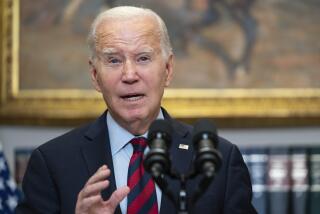Obama’s ambitions outpace his effectiveness
Barack Obama arrived at the White House with a daunting to-do list.
He promised to save the economy from ruin, redesign the healthcare system, reregulate the financial industry, retool energy policy, slow global warming, reform education, write a new immigration law and serve as midwife to a new era of bipartisan cooperation. He said he would close the prison camp at Guantanamo, organize an orderly withdrawal from Iraq, stave off defeat in Afghanistan, negotiate with Iran, make progress toward Israeli-Palestinian peace, convince the world’s Muslims that America was their friend, launch a new drive toward global nuclear disarmament -- and, while he was at it, bring the 2016 Olympics to Chicago.
All those goals were worthy. Some were responses to crises that couldn’t be ducked. But others were electives added by the president. And the agenda quickly proved longer and more ambitious than either Congress or President Obama’s executive branch could handle.
Obama turned out to be masterful at launching new policies but inconsistent at getting them to work. His presidency threatened to fall into a worrisome pattern: the announcement of a lofty goal, the delegation of implementation to second-rank officials, a missed deadline or two, last-minute intervention by the president to rescue the effort from collapse, and, finally, mixed results -- followed by a statement claiming victory.
Take the $787-billion economic stimulus plan that Obama muscled through Congress as his first item of business in February. It was big, bold and ambitious -- but in political terms, it’s been a failure. Most economists say the stimulus has saved at least half a million jobs, but Obama hasn’t convinced most voters that the impact is real. A program to save homeowners from foreclosure has mostly been a bust. The most visibly successful piece of the administration’s economic rescue plan has been its bailout of Wall Street -- a favor investment bankers repaid by awarding themselves huge bonuses.
A Pew poll this month found that only 30% of respondents believed Obama’s policies had made the economy better. A president who made his name as a gifted speechmaker has fallen into a spectacular failure in communicating. He might have served himself better by making fewer trips to Scandinavia and more to construction sites in Middle America.
There’s been an important spillover effect: Obama’s other policies -- on healthcare and energy, for example -- have lost popular support along with his economic plan. Despite the depth of the economic crisis, the public isn’t clamoring for more federal intervention; quite the contrary. That means Obama hasn’t succeeded in building a strong constituency for his overall philosophy of government, a shortfall that will limit what he can achieve from here on.
By historical standards, Obama’s first year wasn’t bad at all. He stopped an economic free fall and got most of the way to a healthcare plan of historic proportions. In foreign policy, he made credible starts in Iraq and Afghanistan, and suffered no outright disasters -- a statement several of his predecessors would envy.
But graded against his own ambitions, he fell short. And by scattering his focus, those outsized ambitions paradoxically diluted the impact of the success he did enjoy.
More to Read
Get the L.A. Times Politics newsletter
Deeply reported insights into legislation, politics and policy from Sacramento, Washington and beyond. In your inbox three times per week.
You may occasionally receive promotional content from the Los Angeles Times.











